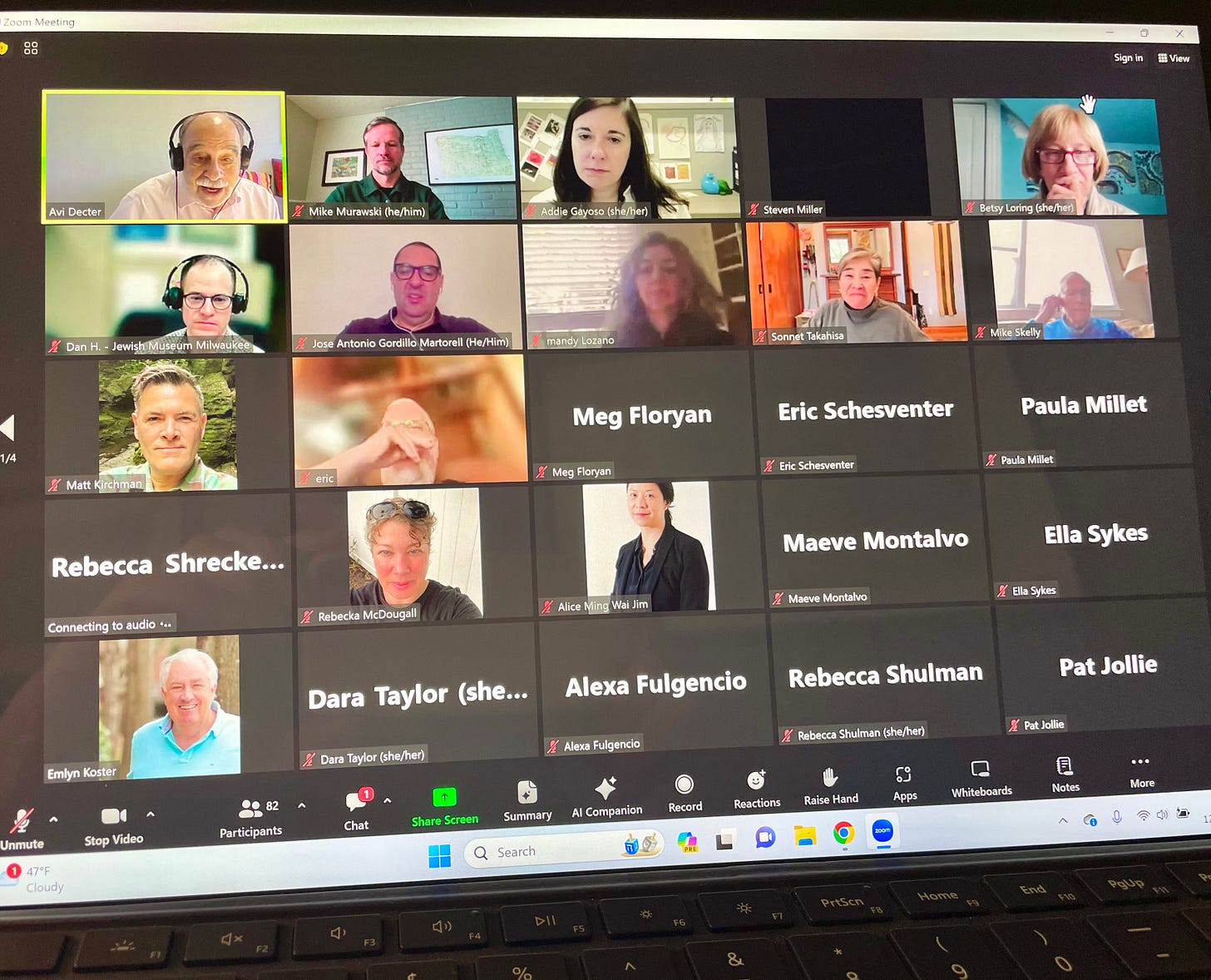Hey Changemakers!
Yesterday, I was fortunate enough to be invited as guest speaker for the monthly “Museums and Change” virtual program series, hosted by the wonderful Avi Decter. And I want to thank everyone for showing up and taking the time out of your day to be part of this gathering.
We filled the Zoom space to capacity right at the beginning, so I wanted to get this follow-up post out as soon as possible with the video link to the program, since I know that many people were not able to join the program.
VIDEO LINK: https://bit.ly/MuseumsBridgingDivides
Passcode: @Yc33w+J
It was a fantastic discussion about museums, politics, and especially bridging divides, with the central framing question: What can museums, cultural institutions, and historic sites do to help bridge the deepening social and political divides in our communities?
My remarks and thoughts gravitated around 4 key questions:
With over 35,000 museums here in the United States alone, can these public-serving institutions step fully and bravely into their role as civically-engaged spaces?
Do museums have a responsibility to engage with the most urgent social and political issues of our time? And how do museums even decide which issues to get involved with?
What role can our museums play to help bridge divides, foster productive dialogue, build relationships, and foster understanding and empathy?
And what are some actions we can take right now to move in this direction?
Some Key Takeaways
I encourage you to watch the video and listen to the program, but I also wanted to share just a few key ideas that I hope you take away from this discussion.
Think locally and listen
As you and your institution engage with important social and political issues, always be listening to your local communities. Actively listen to neighbors, residents, and community members – especially those you have not listened to historically, or are not yet listening to right now. Find out what issues matter most to your communities, and listen to the different and diverse perspectives on these issues. And take a similar approach to your staff and volunteers — find out what issues matter most to them, and invite their ideas on how the museum can take steps to be a space for community and conversation.
Bridging through personal actions
In addition to thinking about how institutions and organizations can change to do the work of bridging divides in our communities, we can also reflect on our own values, beliefs, and actions as individuals. What are the action steps you are taking to build community and strengthen relationships in ways that can cross divides and bring people together? See the section on “Taking Actions” below in this post, and take a moment to reflect on one way you can bring this work into your own personal practice.
The work is happening
Throughout this program, I invited participants to share examples of this work happening in the Chat, and here are a few of the things that people shared:
On the Table: An annual forum hosted by The Chicago Community Trust and designed to take people places—to offices, schools, libraries, restaurants, and other spaces—where they meet others, share ideas, and explore ways to improve their region.
Confronting Hate in Seattle: The Wing Luke Museum is partnering with organizations in the Asian American, African American, and Jewish communities to create an interactive education and public program, "Confronting Hate In Seattle."
One Small Step: Created by StoryCorps, One Small Step is an effort to remind the country of the humanity in all of us, even those with whom we disagree. The initiative brings strangers with different political views together to record a 50-minute conversation—not to debate politics, but to learn who we are as people. Audio recordings of each interview are archived at the Library of Congress.
I’m interested in sharing as much of this work as possible, so if you know of more projects, exhibitions, programs, or partnerships focused on bridging and bringing people together, please share in the Comments below.
Let’s start taking actions
We can talk about these issues all we want, but nothing happens unless we take action—as individuals and institutions. So with that in mind, here is the beginning of a list of possible actions that I shared during this program. And it’s always important to understand that some of the best next steps we can take may be small, imperfect, and in-process. But we’ve all got to start somewhere!
Learn: Stay informed about various perspectives on key issues. Read from diverse sources, and strive to develop a nuanced understanding of complex topics.
Listen Actively: Engage in open, empathetic, and active listening within your local communities.
Have Conversations: Learn strategies for facilitating productive and respectful conversations, & then do it. How can we frame museum experiences in ways that open up dialogue & conversation? How can we have better conversations in our own lives?
Promote Critical Thinking: Share, promote, and model critical thinking skills, particularly the ability to analyze information, question assumptions, and evaluate evidence. Encourage visitors to develop informed opinions rather than relying on emotional reactions.
Participate in Local Initiatives: Get involved in local community organizations or initiatives that aim to bridge divides, promote inclusivity, and address social issues. Grassroots efforts can have a significant impact.
Vote and Encourage Civic Engagement: Participate in the democratic process by voting and encouraging others to do the same. Engage in conversations about civic responsibility and the importance of participating in a democratic society.
Which of these can we begin incorporating into our own personal practice, and which ones can we bring into our organizational practices?
Through this 60-minute program and discussion, we only barely dipper our toes into a deep, broad, and complex topic that I hope we can keep talking about, thinking about, and turning into personal and institutional actions.
“Museums and Change” Zoom Video Link
https://bit.ly/MuseumsBridgingDivides
Passcode: @Yc33w+J




